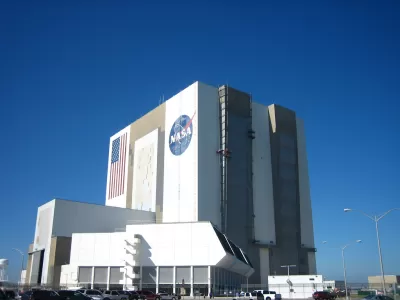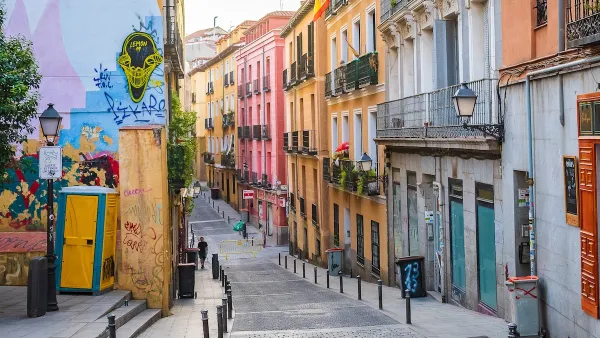Caught between the end of the space shuttle and the potential rise of private sector spaceflight, Cape Canaveral and the Kennedy Space Center present a unique land use challenge.

As the literal launching pad for some of America's most famous achievements, Cape Canaveral now faces an uncertain future. Congress is not about to approve new manned spaceflight programs, and private space companies are still catching up to where NASA was almost 50 years ago. Meanwhile, the Kennedy Space Center lies mostly silent.
Anthony Flint discusses NASA's current multi-dimensional plans for the Florida expanse. While tourism is still a big draw, "NASA clearly wasn't ready to cede this territory completely over to nostalgia. It's all part of a larger political battle, almost willing Cape Canaveral into the future [...] Much of the activity has to do with a fundamental choice that NASA has made: to make facilities available to private sector space initiatives such as Space X."
There's also a green aspect to all of this. "Re-purposing buildings is a common theme here, for both financial and environmental efficiency. NASA dutifully went for LEED platinum rating at the Propellants Maintenance Facility. Over by the area used for testing vehicles on a simulated surface of the moon, solar arrays are being put up, joining a giant solar farm installed in 2008." We'll have to wait and see what's in store for the nation's spaceport.
FULL STORY: The Land-Use Reinvention of Cape Canaveral

Planetizen Federal Action Tracker
A weekly monitor of how Trump’s orders and actions are impacting planners and planning in America.

San Francisco's School District Spent $105M To Build Affordable Housing for Teachers — And That's Just the Beginning
SFUSD joins a growing list of school districts using their land holdings to address housing affordability challenges faced by their own employees.

The Tiny, Adorable $7,000 Car Turning Japan Onto EVs
The single seat Mibot charges from a regular plug as quickly as an iPad, and is about half the price of an average EV.

Seattle's Plan for Adopting Driverless Cars
Equity, safety, accessibility and affordability are front of mind as the city prepares for robotaxis and other autonomous vehicles.

As Trump Phases Out FEMA, Is It Time to Flee the Floodplains?
With less federal funding available for disaster relief efforts, the need to relocate at-risk communities is more urgent than ever.

With Protected Lanes, 460% More People Commute by Bike
For those needing more ammo, more data proving what we already knew is here.
Urban Design for Planners 1: Software Tools
This six-course series explores essential urban design concepts using open source software and equips planners with the tools they need to participate fully in the urban design process.
Planning for Universal Design
Learn the tools for implementing Universal Design in planning regulations.
Smith Gee Studio
City of Charlotte
City of Camden Redevelopment Agency
City of Astoria
Transportation Research & Education Center (TREC) at Portland State University
US High Speed Rail Association
City of Camden Redevelopment Agency
Municipality of Princeton (NJ)





























